#abolish laws even
Text
abolish capitalism
abolish police
abolish prison
abolish work
abolish borders
but to do all that, and keep these abolished, we, most of all, need to abolish money and abolish the notion that things and time have financial value.
#here i explained 'abolish money ^^'#abolish money#abolish police#abolish work#abolish prison#abolish borders#anti work#anti capitalism#anti money#acab#eat the rich#abolish laws even#idc#anarchy#abolish money ^^
11 notes
·
View notes
Text
This is your reminder that ambiguity in a (competently written) story functions to force the reader or viewer to engage on a thematic level, rather than a literal plot level. In other words, you don't "answer" ambiguity with conspiracy-grade theories born and "proven" through easter egg hunts and counting breadcrumbs. The thematic answer, the message of the ambiguous part of the story, should fit regardless of whichever of the likely possible "answers" is the "true answer." Because in cases of ambiguity, the thematic answer is the "true answer."
Do with that what you will.
#literary analysis#the ballad of songbirds and snakes#lucy gray baird#fantasy is probably the most metaphorical genre in general people#asoiaf#fire and blood#hotd critical#hotd#asoiaf fandom#hotd sexism#rhaenyra targaryen#amethyst empress#velaryon boys#strong boys#Did you know that Rhaenyra's story is about MiSoGyNy?#And how in the absence of codified law enforced by a higher power that it's the UNDERSTANDINGS between us that keep society together?#And that weaponizing misogyny and other forms of bigotry to justify severing those understandings for opportunism's sake#is how you end up DESTROYING the social order?#And that even in a “bad” system that's still a “bad” thing to do?#Because you're not abolishing the “bad” system you're simply destabilizing it and seeding the ground for MORE opportunism?#Where FORCE is valued above all else?#In this world in this era we MIGHT call that “fascism.”#And we most certainly wouldn't call it “liberation.”
9 notes
·
View notes
Text
I'm not an expert in this by any means but I do think maybe people should think more sometimes about how (in Britain at least) the process of abolition of slavery had to be presented in financial or economic terms, even to the extent that slaveowners were compensated for loss of property when slavery was made illegal, and it's awful! It's horrific that's how it had to be presented! And people do talk about it but only ever to talk about how horrifying it is, but frankly I think it's an important reminder that sometimes just because something is Right doesn't mean arguing for its rightness is going to cause change or win, sometimes you do have to play the same game in order to win. I think often that sort of behaviour is couched as dishonorable, rather than merely grating and oppressive for those having to follow it, and those who use it are considered dishonorably, but that's not necessarily true.
#not really part of it but also#belle 2013 liveblog#idk I appreciated that they didn't make Mansfield's speech a whole yeah let's abolish all slavery ever speech#because they could have and narratively it would have been more satisfying#like he even says that if the ship really had been out of water he would have said it was lawful to drown the slaves#it's not the full victory by any any means#but you can't always just argue that something is right to those who don't believe it's right and convince them#you have to take steps and you have to work inside their brains rather than dismiss them as idk stupid or too evil to change
27 notes
·
View notes
Text
The Best News of Last Month
Sorry for being not active this month as I had some health problems. I'll start posting weekly now :) Meanwhile here's some good from last month
1. Widow donates $1 billion to medical school, giving free tuition forever
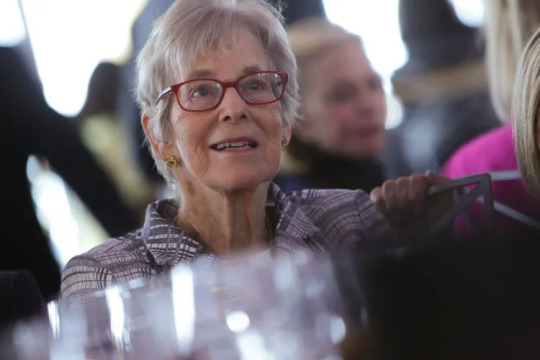
Ruth Gottesman surprised by her late husband's $1 billion in Berkshire stock, decides to donate it in full to the Albert Einstein College of Medicine in the Bronx, New York City's poorest borough. The donation is intended to cover students' tuition indefinitely, ensuring access to medical education for generations.
A video capturing students' emotional reactions to the news, cheering and crying, circulated after the announcement, highlighting the profound impact of the donation on the medical school community.
2. Electric school buses outperform diesel in extreme cold

In Colorado's West Grand School District, electric school buses outperformed their diesel counterparts, particularly in the bitterly cold temperatures of towns like Kremmling, where morning temperatures can drop below -30 degrees Fahrenheit. Despite common concerns about reduced range in extreme weather, the electric buses maintained their battery charge even in these frigid conditions, providing reliable transportation for students.
This success has been welcomed by the school district, as diesel vehicles also face challenges in starting in Colorado's harsh winter weather.
3. Christian Bale unveils plans to build 12 foster homes in California

Christian Bale has led a tour round the new village in California where he plans to build 12 foster homes, as well as two studio flats to help children transition into independent living, and a 7,000 sq ft community centre.
The actor has spearheaded the building of a unique complex of facilities with the aim of keeping siblings in the foster care system together, and ideally under the same roof.
4. Average lifespan of a person with Down syndrome has increased from 25 years in 1983 to 60 years today
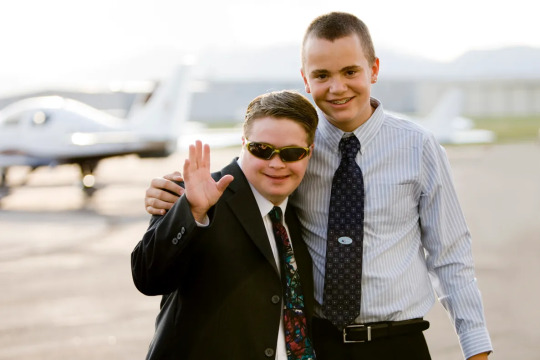
Today the average lifespan of a person with Down syndrome is approximately 60 years.
As recently as 1983, the average lifespan of a person with Down syndrome was 25 years. The dramatic increase to 60 years is largely due to the end of the inhumane practice of institutionalizing people with Down syndrome.
5. Greece legalises same-sex marriage
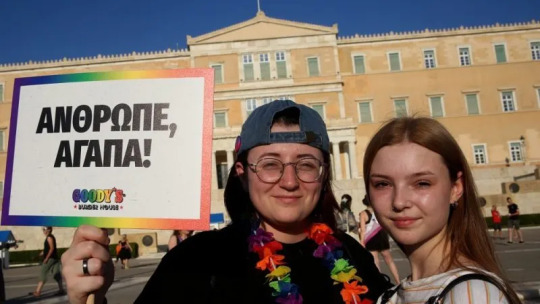
Greece has become the first Christian Orthodox-majority country to legalise same-sex marriage. Same-sex couples will now also be legally allowed to adopt children after Thursday's 176-76 vote in parliament.
Prime Minister Kyriakos Mitsotakis said the new law would "boldly abolish a serious inequality".
6. Massachusetts police K9 tracks scent for over 2 miles to find missing 12-year-old in freezing cold

A Massachusetts police K9 followed her nose to help find a 12-year-old who went missing in frigid temperatures last week, tracking the child’s scent for over two miles, authorities said.
K9 Biza, a female German shepherd, was called on to help after officers learned the child left their home at around 10:30 p.m. Wednesday and was last seen in the Pakachoag Hill area of Auburn, the Auburn Police Department said.
7. Good News for the Socially Anxious: People Like You a Lot More Than You Think They Do, New Research Confirms

The "Lake Wobegon effect" or "illusory superiority" phenomenon highlights people's tendency to overestimate their abilities, but recent research suggests that in social interactions, individuals often underestimate their likability and charm.
Studies indicate that people consistently fail to recognize signals of others' liking toward them, leading to a "liking gap" where individuals believe they are less likable than they actually are.
Techniques such as focusing more on others during conversations and genuinely expressing interest in them can help alleviate social anxiety by shifting the focus away from self-criticism. Ultimately, understanding that others may also experience similar anxieties can lead to a more relaxed and enjoyable social experience.
---
That's it for this week :)
This newsletter will always be free. If you liked this post you can support me with a small kofi donation here:
Buy me a coffee ❤️
Also don’t forget to reblog this post with your friends.
3K notes
·
View notes
Text
1989: Australian voting laws are changed to require political parties to have 100 members before they can run for office, after the Australian Capital Territory election ballot sees entries from The Sun Ripened Warm Tomato Party, The Party! Party! Party!, and The Surprise Party.
Even with this requirement, The No Self-Government Party and their rivals The Abolish Self-Government Coalition gain almost 20% of the vote, gaining 4 seats in the Capital's parliament.

2K notes
·
View notes
Text
The A in LGBTQIA+ doesn't stand for aspec because they're not repressed!
(please read the disclaimer at the end of this post)
Ummm, excuse me? Would you mind telling me what your definition of repression is, then?
Because I feel repressed when a doctor asks me about my sex life, and if I say I have none, it gets marked down as a symptom without being asked if I suffer from it.
I feel repressed when my gyn tells me I can't get a hysterectomy yet despite losing so much blood on every period that I need to take iron supplements all the time, because I could change my mind about not wanting children (which is a whole other post, I know, but it's most likely linked to sex).
I feel repressed if I can't use dating apps or platforms because my sexuality doesn't even exist there, and the one time I tried, I got called names because I didn't want to meet for because it was clear where this date would go, despite my explicit "what I'm looking for".
I feel repressed when I think about how recently a paragraph was finally abolished in my country that considered sex a vital part of a marriage, basically entitling the spouses to having sex with their partner (both gender neutral, because entitling people to having sex with somebody else by law is wrong. It's basically a rape permission).
I feel repressed when I can't watch any film or show without it being about love and/or sex, no matter if it fits the narrative and furthers the plot.
I feel repressed when I plot my own stories and automatically put a romantic couple in there as main characters, even though I have no idea why this would be important for the plot. Not even my own stories, my own thoughts are mine.
I felt repressed when I was asked accusingly in a relationship if I wasn't missing something before I even knew asexuality as a spectrum was a thing, and having to lie about this being a side effect of my medication instead of genuinely not feeling attracted to someone in this way.
I feel repressed when I can't tell people I'm not sexually attracted to them because they will take this personally no matter how well I explain myself.
I feel repressed when everywhere I look there's advertising relying on naked skin, suggestive posing and objectification. Why are expensive cars still presented by women considered beautiful and tempting? It's not like that's necessary to convince people of spending so much money on a thing that gets you from A to B. Couches with women in smart dresses and high heels. That's not what a normal person looks like on a couch. But the worst is a truck in the town where I live: it's from a small fruit and vegetable stand, so whenever I see it, it comes from the warehouse, delivering groceries. On it is a woman clad in very little, presenting fruit. I'm sorry, but why? Does a misogynistic picture convince you of the necessity to avoid scurvy?
I feel repressed when I tell people and get the answer "you just haven't found the right person yet", because there are two possible assumptions from that point: I'm either not trying hard enough (so it's basically my own fault) or something about me is not right, appalling even (which circles back to I'm not trying hard enough or frames me as a victim of my genetics, upbringing or circumstances to be pitied).
Do not tell me how I feel. Do not try to tell me everything is fine and I shouldn't complain or ask for acknowledgement if everywhere I look, I'm reminded of how odd, how weird and how not normal I am. How much it inconveniences you to even acknowledge my existence, let alone respect any of my traits, views and choices.
And while I can only write from my own asexual point of view, I wrote this with all kinds of flavours of aspec in mind, so I'm explicitly including aromantics, aroace people and every shade of the spectrum in this. Not all my examples may apply to you, but I hope you can find something to relate to.
ETA: please feel free to add your own experiences of repression!
#asexuality#somewhat of a vent#asexual#ace pride#ace#acespec#aromantic#aroace#read disclaimer at the end of post#aspec
724 notes
·
View notes
Text
ABOLISH THE MONARCHY (in this brand new TTRPG)
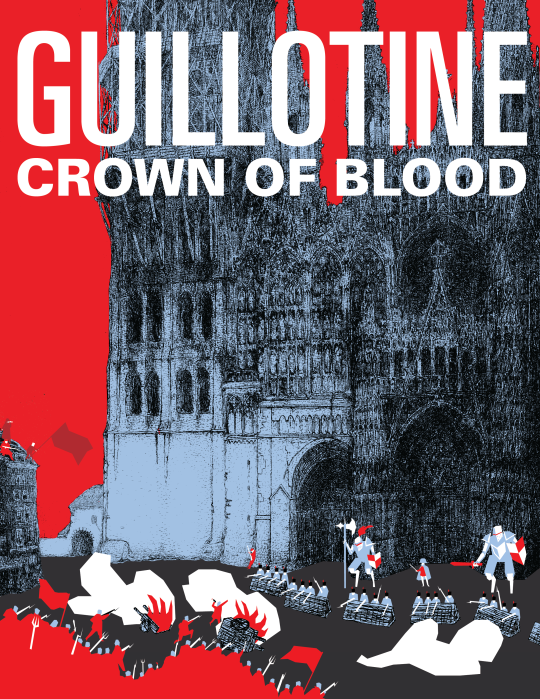
Guillotine: Crown of Blood
Harness heretical magic, discover cutting-edge technology, and overthrow the crown in this Gothic fantasy TTRPG.
KICKSTARTER LINK
--------------
GUILLOTINE: CROWN OF BLOOD is a TTRPG where you can -- and should -- destroy the Crown. Use magic. Use wit. Use weird new technology, forged by your own hand. Use prayer, even if it's unorthodox. Use rhetoric to win hearts and minds. Or just beat the shit out of them. It's up to you.
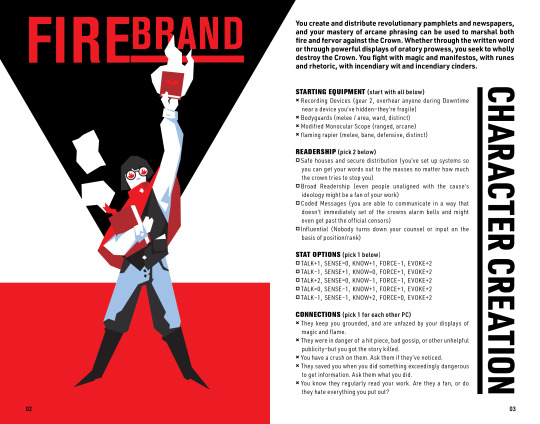
Fact Sheet:
FUNDED IN JUST SIX HOURS!! Plus, we've unlocked our first stretch goal (character generation tables!)
Runs on the Powered by the Apocalypse system.
Based on games like Armour Astir, Heart: The City Beneath, Monsterhearts, and Monster of the Week.
Play as members of a Cause, against an oppressive Crown of your own making -- then play as the antagonists during a Villain Turn where you can torment each other's characters, or otherwise advance the plot.
Ten unique playbooks.
Includes weird magic, talking your way out of trouble, strange gods, and a worrying amount of blood.
Mechanics that let you become unhealthily obsessed with your friends, lovers, rivals, and political scapegoats. The more you interact, the more you understand them: for better or worse.
BONUS: Use Martyr moves to permanently remove your character from the narrative, irrevocably changing the fabric of the city, the revolution, or even the laws of physics!
All you need are some friends (or at least fellow travelers) and you're good to go! Do you have what it takes to destroy the Crown? Will you destroy yourself in the process? There's only one way to find out.
KICKSTARTER LINK
PLAYBOOK PREVIEW
ART PREVIEW
#indie ttrpg#ttrpg#guillotine ttrpg#guillotine crown of blood#pbta#kickstarter#kickstarter ttrpg#dark fantasy ttrpg#gothic ttrpg
846 notes
·
View notes
Text
"Amatonormativity permeates more than TV shows and books. It is woven into our legal rights, creating forms of discrimination that become more and more apparent as people age. Romantic love within marriage confers privileges that other forms of devotion cannot, including over 1,100 laws that benefit married couples at the federal level. Spouses can share each other’s health insurance, as well as military, social security, and disability benefits. They can make medical decisions for each other. Companies grant bereavement leave for spouses, no questions asked, but there will be more hesitation if leave is requested for a mere friend. It is possible to marry a stranger and give them your health insurance but not possible to give health insurance to a parent...
Criteria based on sex made sense when the main purpose of marriage was to merge fortunes and produce children, but today...marriage is more about a match of devotion than a match of trade. In many cases, the point is no longer to create an heir and a spare. Plenty of married couples don’t have children (or sex, for that matter), and bad marriages with little caring are common...
Offering legal and social benefits only to the romantically attached suggests that the mere presence of romantic feeling elevates the care and deserves special protections, even though friendship and other forms of care, which can come with less obligation, can include more love, more freely given. Therefore, the legal and social privileges of marriage should be extended to all mutually consenting adults who wish for them...
'In terms of policy, marriage law really reaches into all areas of law, like tax and immigration and property,' ... 'It doesn’t matter if it’s different-sex only or same-sex marriage, so long as we restrict marriage to romantic and sexual partners we will ensure amatonormativity.' Reforming marriage law by abolishing it altogether or extending marriage-like rights to friends (to small groups or networks) is one way to eradicate discrimination."
Angela Chen, Ace: What Asexuality Reveals About Desire, Society, and the Meaning of Sex
897 notes
·
View notes
Text
They End Up In a Universe Where The Two Of You Hate Each Other [Twst]
˗ˏˋ ★ ˎˊ˗SYNOPSIS: The two of you are happily dating and he couldn’t have asked for anything else, however, one day he finds himself in a strange place only to find that here the two of you are enemies.
♡︎Enemies to lovers????
♡︎Includes: Riddle and Leona
[AU Masterlist]
[Here] ☆[Azul and Jamil] ☆[Vil and Idia] ☆[Malleus]

⋆⋅☆Riddle
The fate of this Riddle had been written. He would ascend to the position of the King of the Queendom of Roses as his mother passed away, and he would transform into a worse tyrant than her. Eventually, everyone he thought he could trust would turn against him.
──── ⋆⋅☆⋅⋆ ────
Riddle was dumbfounded when he opened his eyes, only to find himself in front of thousands of people, a crown on top of his head, proclaiming him as the King of this strange land. The people in front of him bowed in fear of his rules, as he was nothing more than a tyrant in this unfamiliar place.
Days passed as he tried to comprehend how he ended up in such a peculiar setting – one where Night Raven College didn't exist, and his mother, once the queen, had just died, making him the King of the Queendom of Roses. Along the way, he encountered some of his friends such as Trey and Che’nya, but none of them seemed to enjoy his company, only interacting with him out of fear, just like anyone else. For Riddle, this didn’t make any sense. He knew that his past actions in his universe had been that of a tyrant, but he had changed with your help and that of his friends who were here by his side. Seeing himself in a similar situation again, he decided to alter the course of history that dictated he be betrayed by his own people.
“Stay still, or I will cut your throat.” Finally, you entered the picture. Riddle had questioned when you would show up since he arrived. At first, he thought that maybe you would be one of the party members seeking his hand in marriage, but he felt that wouldn’t entirely suit you. He knew that when you showed up, you would turn his world upside down because that was the impact you had in his universe. You stood in front of him, a knife dangerously close to his throat, ready to cut it if he made any stupid moves. If this had been someone else, he would have been ready to fight, ready to call the guards and collar you. However, deep down, even with a knife next to his neck, he knew that he could trust you.
You were an assassin, meant to kill the tyrant king, driven with only this purpose. It had been one of your group that had murdered the Queen, and now it only lasted for you to finish the job of ending the tyrant's bloodline. However, strangely after the king’s coronation, you started seeing a strange change in his actions. The once tyrant man who collared everyone in the city came back to uncollar them. He hosted tea parties for the people in the city and abolished some of the laws his mother had created. Did you really have to kill someone like that? Was he as bad as everyone made him seem? You decided to check for yourself, and with that, you found that Riddle was, in fact, someone with a gentle heart.
“I wish to undo what my mother started,” you heard his docile words, a questionable expression on your face. Did he really mean that? He could be trying to lower your guard to call the guards, but within his eyes, you saw no sign of lies. He meant what he had said, he truly wanted to better the Queendom. You decided to give him one chance, for if he failed, you would come back to take his life.

⋆⋅☆Leona
The fate of this Leona had been written. He would kill his brother out of jealousy for ascending to the throne, and over time, he would be overthrown by his own nephew, left to be alone and mocked.
──── ⋆⋅☆⋅⋆ ────
A story that Leona deemed fitting for him, as he once again witnessed his brother achieving what he had desired, becoming even here the shadow of his own brother. Most of his days were spent lazing around, knowing that no good would come from trying to follow the predetermined path laid out for him. Unless he did things differently.
The sweet taste of power was intoxicating, and he planned everything with immense detail, confident that everything would turn out perfectly. That was until he saw you. You, hailing from another land, sought to establish a peaceful connection between the realms. Upon seeing him, you strolled towards him with a fiery look, as if commanding him to behave. If it had been anyone else, he might have lost his composure, making sure you would regret ever looking at him disrespectfully. But he could never do that to you. He almost found the expression amusing, almost as if you had turned into his lucky angel, advising him to halt his plans before he could end up as fate had written for him here.
“Why are you always lazing around?” The sweet melody of your voice captured his attention, but there was nothing sweet about it. Your hands rested on your hips as you looked down at his figure. To anyone hearing you speak, it would seem as if you hated him, and to a point, you actually did. The fact that you saw so much potential in Leona, and yet the only thing he seemed to do was sleep, made you furious beyond belief. You had come from a family that demanded perfection, and perfection you had to become. Working day and night to fulfill their expectations, you aimed to continue their bloodline. Seeing someone like Leona, who appeared to have been born with everything you had to work so hard for, made you mad.
“Why not join me for once?” He asked, tapping the grass next to him, a mocking tone present in his voice as he checked if you could lower your guard to fulfill his wish. In truth, he just missed the moments back in his universe where he would lay his head on your lap as you talked about your day. Yet, the you from this universe wasn’t so thrilled with that idea, and he watched as you turned around with a roll of your eyes.
Your encounters were filled with glares, as you didn't seem to enjoy his company and spoke ill of him. However, somehow, even if mean, he found himself enjoying the time spent with you, albeit fleetingly. While he glanced at your departing figure, wishing to spend more time with you, he knew that, just like in his universe, you were meant to be by his side.
#twst#disney twst#twisted wonderland#twst wonderland#twisted wonderland x reader#twst reader#disney twisted wonderland#twst x reader#x reader#riddle rosehearts#riddle rosehearts x reader#twst riddle#twst writing#twistedwonderland#riddle x reader#leona kingsholar x reader#leona kingscholar#twst leona#leona x reader
465 notes
·
View notes
Note
i really dont know how to tell people that Copyright Laws Are Good, Actually. every time a company like disney or nintendo abuses copyright laws people always start talking about how copyright should be abolished, and in an ideal world, copyright laws wouldnt be necessary. but in the world we live in copyright laws are very much needed for creatives. while it's easy to be reactionairy when nintendo unfairly removes a fangame or disney threatens people over mickey mouse, people really need to understand that copyright laws are the only things stopping corporations and even other people from exploiting smaller ips. like, imagine if hasbro started making toys of your projects with no consent or contract or payment. that's what copyright laws are stopping
taking this in best possible faith, this is still an opinion completely unmoored from any material understanding of how IP works to the point where I can't take it seriously.
if hasbro started making toys out of my project without my consent, in the world we currently exist in, I would have little to no recourse simply because I could not win a court case against hasbro. they would drag it out and I would be in financial ruin long before I could achieve anything
if I made something similar to a hasbro property without infringing on their IP and they came down on me under the pretense that I had infringed, I would likely have to reach a settlement and shutter my project. it would not matter whether or not I was right
copyright does not protect you: it protects people who can afford to wield it
and making an assumption that you and I are more likely to be economic peers than not, we cannot afford to wield it
623 notes
·
View notes
Text
Spanking is to parenting what prisons are to criminal justice. Allow me to elaborate:
What does spanking do? “It teaches kids to behave!” Actually, no. It teaches kids to fear their caregiver(s). But say we go with that line. How does spanking teach kids to behave? “It shows them the consequences of bad actions!” Actually, no. It shows kids that when the caregiver is displeased, the kid gets hurt. In the mind of the child, the sequence of events is not [misbehave:consequence]. It is [caregiver unhappy:pain]. And maybe you’ll say “But my kid stopped mouthing off after I started spanking them for it”. Okay, sure. Maybe they stopped responding when you argue, but only because the learned to fear what their response would bring. They’re not holding their tongue because they realized it’s disrespectful or rude or whatever else you believe it is. They’re holding their tongue because they know it won’t do any good and will only make the situation worse for them. I can guarantee they are still thinking all those rebellious naughty talk-backy thoughts. They just aren’t saying them out loud. Spanking did not teach your child to behave, it taught them to walk on eggshells.
Similarly, prisons do absolutely nothing to enforce laws. Prisons do nothing to fix the real crimes that do get committed. A shooter or rapist or embezzler being incarcerated does not bring their victim back to life, un-traumatize them, or make reparations for any damages. Additionally, it makes life a living hell for the innocent people who end up in jail (OF WHICH THERE ARE A HELL OF A LOT). And maybe you might say that the point of prison is to encourage good behavior, because no one wants to go to jail. I would ask, then, why there are so many prisons, of which so many are full or overcrowded. Clearly, the threat of incarceration is not keeping people out of jail. Additionally, much like a child who was spanked being afraid to do normal things in their own home for fear of displeasing their caregiver, regular non-criminal people are afraid of prison, even though they have done nothing wrong. They know they could be incarcerated because of falsified evidence, biased testimonies, unfair trial, or simply bigotry. Especially people of color. Even though they haven’t done anything wrong, they are scared of what could happen to them if the person in power (police) was unhappy with them.
Negative consequences unrelated to the actual incident do not discourage “bad behavior”. Just like a child who is spanked will simply learn to be sneakier, a thief who goes to jail will simply cover their tracks better next time.
Stop spanking your kids, and abolish prisons. Have a nice day.
#gentle parenting#criminal justice system#prison abolition#police brutality#parenting#corporal punishment#prison system#child abuse#don’t hit your fucking kids
664 notes
·
View notes
Text
A symbol had been illegal for centuries. So illegal that it wasn't even drawn or described in the very law that banned it. Many people knew the symbol anyway; rumor had it that from time to time someone would see it in their dreams and feel compelled to recreate it. From childhood, everyone was warned that it was strictly forbidden to recreate any symbol you'd learned in your dreams, just in case one was the symbol. Kids got detention for doodling odd shapes, in case they were lying about whether they'd seen them in a dream, even when the teachers themselves weren't sure whether any of the doodled shapes were taboo. Every once in a while some bold rebel would take a dream symbol and carve it into a bench or spray paint it on a wall—but how could one know which one was demonic?
The otherwise secular government claimed the symbol was banned because it invited in a "demon" that wanted to destroy the world. There were, allegedly, both monks and scientists dedicated exclusively to searching for a way to permanently block entry to the demon. And there was, allegedly, a high suicide and insanity rate among these monks and scientists. Until they succeeded in their work, the law remained.
Some people railed against the ban—calling it absurd, backwards, primitive—every other law rooted in religious belief had been abolished decades ago, why not this one? The controversy had most recently flared up a few years ago when a politician had campaigned for governorship on a platform of repealing the ban, along with several dozen other laws he said unduly restricted the people's freedoms and civil liberties. "Where is this demon," he'd asked in a televised debate, his yellowed eyes darting around the room. "Can anyone produce him? Can you prove he's real? Why are we deciding national policy based on superstition?"
When he'd lost the election, he'd called a press conference, railed against the ignorant voters—"what's so liberating about democracy if you vote against your own freedom?"—and then held his fingers in front of his eyes. All the cameras had cut within a couple of seconds, but not before catching his shrill, taunting laugh.
In rebroadcasts of his scandalous speech, his face was censored by a thick black square. The disgraced politician killed himself in police custody. He'd wrapped himself tight in his cloak and set it on fire. She thought about that a lot—what it would be like to feel flames crawling up your limbs.
Enough kids at school had happened to see the live broadcast that they could teach the symbol to other kids when they thought the teachers weren't looking.
And that was how Pyronica had learned the forbidden symbol: a single eye inside a triangle.
Today, she pulled out a can of spray paint she hadn't yet converted into a makeshift flamethrower and followed in the footsteps of countless weird little girls across the multiverse seeking a remedy for their rage:
She tried to summon a demon.
#gravity falls#bill cipher#pyronica#my writing#(I just like the worldbuilding here. There's so much happening under the surface.)
265 notes
·
View notes
Text
LGBT+ Victorians
Since it's Pride Month and Dracula Daily is going to be pretty quiet for most of June, I thought it might be good timing for a little 1890s queer history. Plus I wanted to give a bit more fuel to everyone's queer headcanons for Dracula characters!
Popping this under a cut because it's long.
The start of queer identity
This is a massive generalisation, but for most of British history, being queer was about action and not about identity. The idea that people who wanted to have gay sex belonged to a specific group that was different to other people didn't exist for the most part, at least not at a societal level. (This was also true - more generalisation - for much of the western world. It was very much not true for large swathes of the rest of the world who thought about this in entirely different and varied ways).
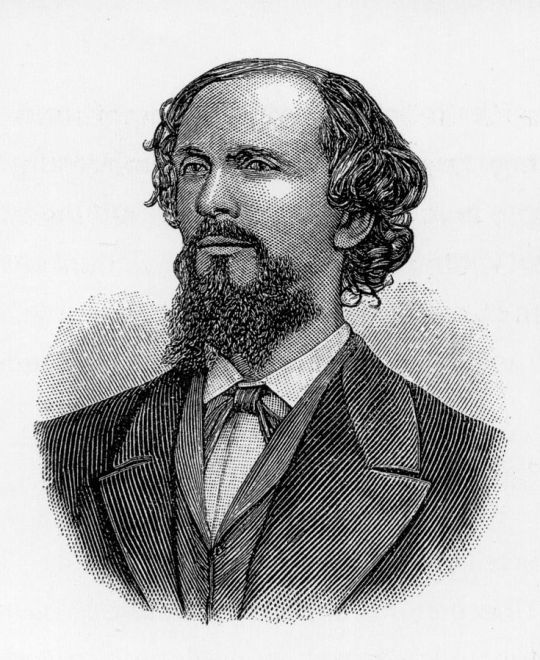
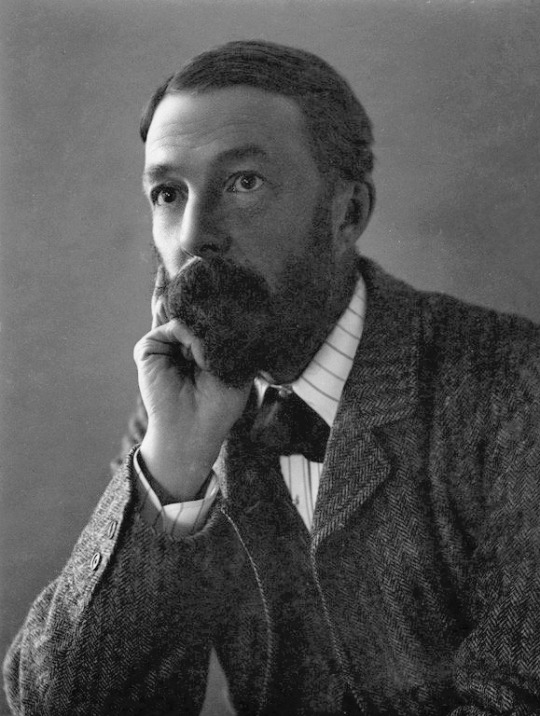
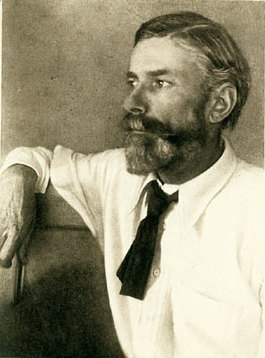
By the second half of the 19th century, that was starting to change. People like Karl Heinrich Ulrichs in Germany (on the left), and John Addington Symonds (middle) and Edward Carpenter (right) in the UK started to think of themselves as homosexuals - Ulrichs coined the term "Urning" which became "Uranian" in English. This period marked the beginning of organised campaigning for LGBT rights in the UK, though specific campaigning for lesbian and trans rights came later.
This means that in the 1890s setting of Dracula, any characters might think of themselves as "Uranian" or "Sapphic", or they might not yet have picked up that way of thinking. At a guess I'd expect Seward or van Helsing to be particularly aware of the new theory around homosexuality.
LGBT rights in law
It was a mixed time for the legal position of LGBT people. The death penalty for sodomy was abolished in 1861 in England, Wales and Ireland (1889 in Scotland), and replaced with minimum 10 years hard labour. In 1871, two amab people, Boulton and Park, were tried for dressing as women, but the judge ruled that this was not an offence under English law (though he also said that he thought it should be).
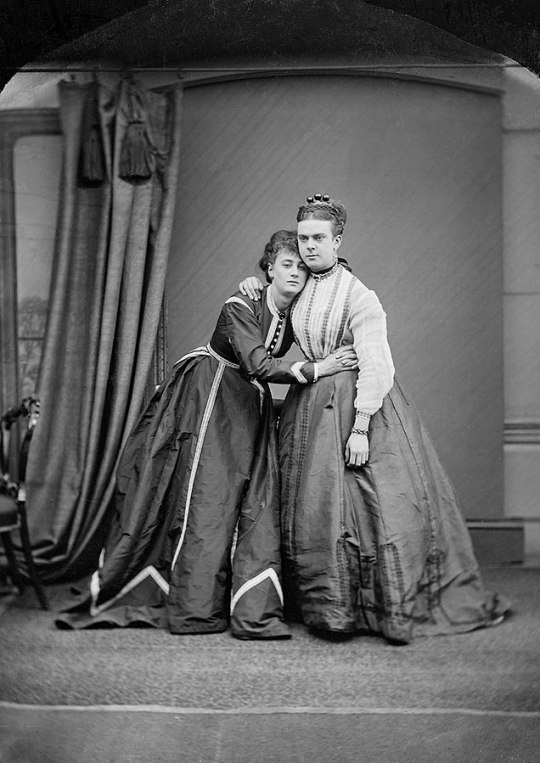
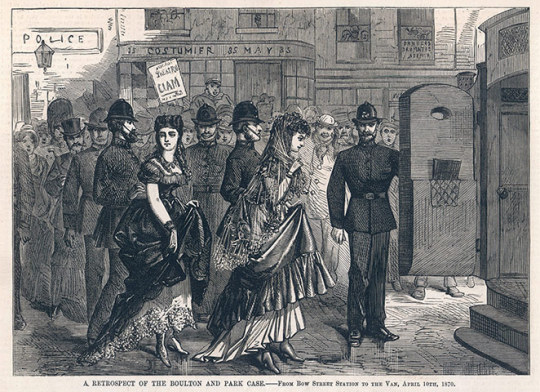
On the left: Fanny Park and Stella Boulton; on the right, the Illustrated Police News' depiction of their arrest.
And in 1885, the Criminal Law Amendment Act reduced the minimum sentence for gross indecency from 10 years' hard labour to two.
That said, before that act was introduced, there had to be a witness to any sodomy or gross indecency for it to be prosecuted. The Criminal Law Amendment Act changed that, so all private acts, arguably even love letters, could be prosecuted. So despite the reduction in sentences, this change to the law made life harder for queer men in the 1880s and 1890s. From a Dracula perspective, this means that people would be much more careful about what they wrote down - significant for a novel made up of documents.
Lesbian sex has never been illegal in the UK. (The idea that this was because Queen Victoria didn't believe in lesbianism is a myth). But in the 18th century there were a series of prosecutions of afab people who lived as men and married women. They were prosecuted for fraud when their birth sex was discovered, because they were perceived as having defrauded their wives. There were far fewer such prosecutions in the 19th century, possibly because of the belief that it was better not to create the publicity of a trial.
Victorian WLW
There are HEAPS of notable Victorian lesbians and bisexual women, including a lot in the suffragette movement. So I've chosen a few examples based on there being good images on Wikipedia.
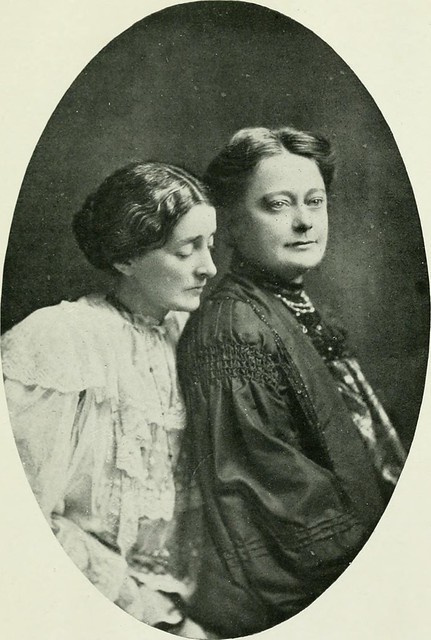
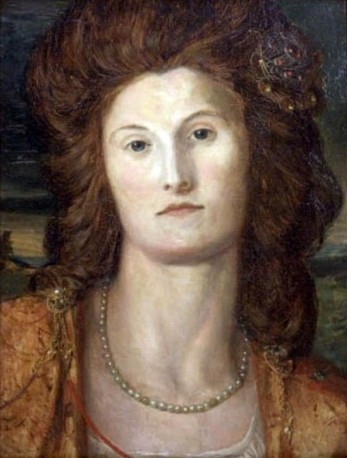
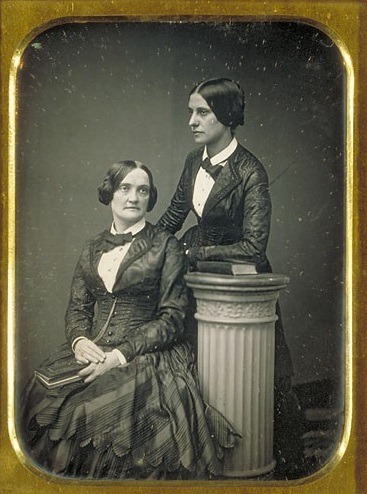
From left to right:
Margaret Benson and Janet (Nettie) Gourlay were Egyptologists who met at the excavation of the Precinct of Mut. Almost all of Benson's family preferred same-sex relationships.
Louisa Baring, Lady Ashburton, was briefly married to a man, but when she was widowed, began a 25-year relationship with American sculptor Harriet Hosmer. Harriet described herself as Louisa's "hubby".
Matilda Hays was a mixed-race writer and actress who had a relationship with American actress Charlotte Cushman, with whom she's pictured. Hays aimed to use her writing to improve the condition of women.
Victorian MLM
Again, I've chosen people to highlight through the very representative method of good photos.
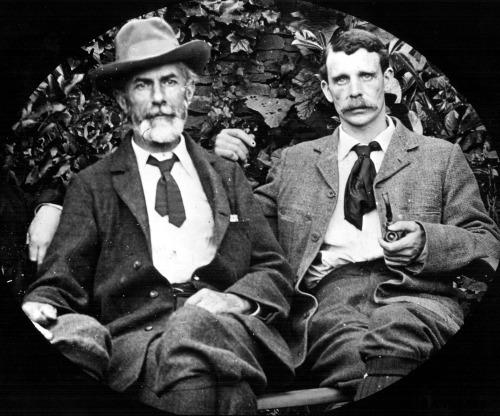
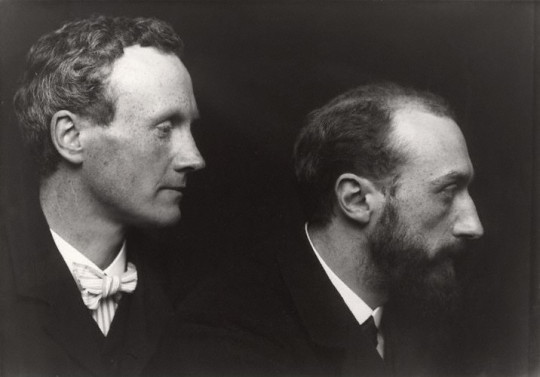
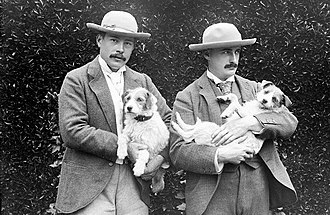
From left to right:
Edward Carpenter was a socialist, poet, philosopher and early gay rights activist who met his partner George Merrill on a train. The two men came from very different backgrounds: Carpenter from privilege, and Merrill from the Sheffield slums. Their 40-year relationship inspired the ending of EM Forster's novel Maurice.
Charles Ricketts and Charles Haslewood Shannon were artists who met as teenagers and lived together for more than 50 years. In the Times' obituary for Ricketts in 1931, their relationship was described as being "as remarkable as any of the great historic friendships, or the finest Darby and Joan examples of wedded felicity".
Ned Warren and John Marshall were art collectors who together were largely responsible for the Roman and Greek Art Collection of the Boston Museum of Fine Arts and the Metropolitan Museum of Art. Marshall married Warren's cousin, Mary Bliss, but only on the condition that the marriage would not be consummated. All three lived together until they died and were buried in the same tomb.
Trans Victorians
I wrote last year about Dr James Barry, a Victorian trans man, in the context of whether Jack Seward could be trans. (The post is from October, but spoiler free).
Eliza Edwards was an actress who died in 1833 at the age of 24. Her body was autopsied, and discovered to be - in the words of the autopsy - "a perfect man", which had apparently not been known to any of her friends or colleagues.
Harry Stokes was a bricklayer in Manchester, who was outed as trans in newspaper articles during his divorce 1838 and again after his death in 1859. He became something of a figure of fun after being first outed, but met another woman who lived with him as his life, and was broadly accepted by the local community as a trans man.
It was only through chance that James, Eliza and Harry were outed (and in James Barry's case, despite considerable efforts on his part). There might well have been hundreds or thousands more people like them.
And Boulton and Park, who I mentioned above, have usually been treated as transvestite men by historians, but could equally - had they had the terms themselves - be identified as trans women. Some contemporary newspaper articles even used she/her pronouns for them.
Asexual Victorians
Asexuality is tricky to spot in history, though even in 1896, German sexologist Magnus Hirschfeld was identifying it as a distinct phenomenon. What we do know is that more than 10% of women and a little under 10% of men in the 1890s never married, and in some cases that may well have been because they were asexual or aromantic.
From a Dracula perspective, family rumour held that Florence Stoker declined sex with her husband after the birth of their child. That may or may not have been true (and there's a ring of aphobia to some of the family's claims) but it shows how asexual people might also be found in apparently conventional marriages.
Sources
British Library: A Short History of LGBT Rights in the UK
British Library: A timeline of LGBT communities in the UK
Girlfriends of Dorothy: A Timeline of Lesbian Rights UK 1601 - 2020s (note: the site intends to be trans-inclusive, but genders John Barry as female.)
Open University: Lesbianism and the criminal law of England and Wales
“Constant Companions” and “Intimate Friends”: The Lives and Careers of Maggie Benson and Nettie Gourlay
Sapphic sexuality: lesbian myth and reality in art and sculpture
British Library: Transgender identities in the past
Warp and Weft: The extraordinary life of Harry Stokes
British Academy: Happy Families?
Coitus Interruptus: Sex, Bram Stoker, and Dracula
'Missing person' Florence Stoker added to DIB
750 notes
·
View notes
Text
„why are radical feminists always talking about male violence? women can be violent too“
listen. violence will always exist because it is not (just) a gendered issue. even in a non-patriarchal society, there will be violence, because its sadly human nature to some degree. we as a society should strive to reduce violence. for that, we need to figure out why people become violent and how to prevent it, and how to protect potential victims, and how to intervene and stop violence that is already taking place.
in a patriarchal society, male violence is incentivised, fostered, legitimised, and even protected. female violence is not.
violence is essential for most conceptions of masculinity; the ability and will to enact violence to restore your or your familys honour, for example. that is not expected of women. the military is a male institution, meant to defend and protect; reflecting mens supposed role in the patriarchy to defend and protect (with violence if needed). women are the creators of life, meant to be nurturing, passive. being aggressive is unfeminine - its masculine. men who are not aggressive/violent enough are actually chastised by other men and sometimes even women (for example being called pussy, gay, which is demeaning in a patriarchal context). a man hitting his woman is considered right and normal still in a lot of milieus and cultures, and has been for the longest time. a man enacting violence is living up to his manliness, other men respect him for it most of the time, especially if its against women or even other men. gang violence is another good example of this: men not bound to law will resort to violence.
the patriarchy needs male violence: the constant threat of male violence keeps women in our meant role as submissive and small, and other men in a constant need to prove themselves, keeping the cycle of violence going. so women need men to protect us, from other men. and we accept and excuse mistreatment and disrespect by men.
and then there is sexual violence which men are already more predisposed to enact because they have a penis, and a penis can reach orgasm by penetration whether that be forceful or not. and then the patriarchy enforces this through phallocentrism, through a culture of treating the penis as a weapon, as superior, as a tool that can dirty and undignify others. as a means of enacting violence. this is not the case for vaginas, they are reduced to just „holes“. penetration and how its treated is a key element of the patriarchy. homophobia stems from this too: penetrating someone is treated as an act of domination, and its supposed to be men dominating women this way, which means men being penetrated are „lesser“ men or even considered feminine.
this is why we need separatist options. single sex spaces, especially when girls and women are in an intimate or vulnerable position there. to protect. this is why we talk about male violence, to uncover the roots, how it is ignored, downplayed, and even encouraged and justified, which leads to violence. female violence is sometimes not taken seriously because it is not meant to exist, it is against feminine gender roles and how women are supposed to act in the patriarchy. which means if gender was abolished - which radical feminists are striving for - this issue would be solved with it.
225 notes
·
View notes
Quote
Donald Trump's anointment as some type of new Jesus Christ exists in the much larger context of how white right-wing Christian fundamentalists view Trump as a tool for their anti-democracy theocratic project. Likewise, Trump has no respect or sincere interest in "Christianity" and the Christian right: They are just a means for him to get and keep unlimited power.
Calling Trump's martyrdom "a symptom of a much larger—and much more dangerous—problem," Candace McDuffie writes at the Root: "Nothing is beneath the right to cling to power and propping up Trump as a political sacrifice was perhaps a predictable move. Even though it's obviously outrageous and ridiculously tone-deaf, it's how conservatives have always moved—and it's proven alarmingly effective."
She continues: "The irreparable damage conservatives have done to Americans in the name of religion continues to harm marginalized and vulnerable groups. Whether its laws that attempt to eradicate trans people, abolish women's rights, employ deadly police forces or emphatically uphold the right to bear arms, Christianity has become the go-to excuse for Republicans to act however they like."
A fascist Jesus Christ: MAGA turns Donald Trump into a martyr
699 notes
·
View notes
Text
“The ‘war on drugs’ may be understood to a significant extent as a war on people. Its impact has been greatest on those who live in poverty, and it frequently overlaps with discrimination directed at marginalised groups, minoritiesand Indigenous Peoples. In our reporting and experience, we have found that such discriminatory impact is a common element across drug policies with regard to the widest range of human rights, including the right to personal liberty; freedom from torture, ill-treatment and forced labour; fair trial rights; the right to health, including access to essential medicines, palliative care, comprehensive drug prevention and education, drug treatment, and harm reduction; the right to adequate housing; freedom from discrimination and the right to equal treatment before the law; right to a clean, healthy and sustainable environment; cultural rights and freedoms of expression, religion, assembly and association.
Globally, drug control has had massive costs for the dignity, humanity and freedom of people of African descent, with reports showing that people of African descent face disproportionate and unjust law enforcement interventions, arrests and incarceration for drug-related offences. In various countries, the ‘war on drugs’ has been more effective as a system of racial control than as a tool to reduce drug markets. Policing interventions based on racial profiling remain widespread, whilst access to evidence-based treatment and harm reduction for people of African descent remains critically low.
Around the world, women who use drugs face significant stigma and discrimination in accessing harm reduction programmes, drug dependence treatment and basic health care. Although one in three people who use drugs are women, women constitute only one in five people in treatment. Women are also disproportionately affected by criminalisation and incarceration, with 35% of women in prison worldwide having been convicted of a drug-related offence compared to 19% of men. The causes of women’s interaction with the criminal justice system in relation to drugs are complex, often linked to other factors such as poverty and coercion, and may reflect systemic gender inequality in society more broadly. Of note, most women in prison for drug related offences have little education.
Under international law, States that have not yet abolished the death penalty may only impose capital punishment for the ‘most serious crimes’, meaning crimes of extreme gravity involving intentional killing. Drug offences clearly do not meet this threshold. However, drug-related offences are still punishable by death in over 30 countries, and human rights experts have raised concerns about evidence of its discriminatory impact on individuals belonging to minorities.
Everyone without exception has the right to life-saving harm reduction interventions, which are essential for the protection of the right to health of people who use drugs. However, according to UN data, only 1 in 8 people with drug dependence have access to appropriate treatment, and the coverage of harm reduction services remains very low. The situation is particularly critical for women, LGBTIQ+ persons, and other marginalised groups, for whom harm reduction and treatment services may not be adapted or respond to their specific needs. Women and LGBTIQ+ persons also face even higher levels of stigma, including self-stigma, and discrimination than men who use drugs.
As the world grows older, drug use among people over 65 has also increased. The COVID-19 pandemic had a negative impact on the health and well-being of older persons, and studies show an increased use of pain relievers, tranquillizers, and sedatives among this age group. Older drug users are also more often using the dark web, social media, and online forums to obtain illicit substances resulting in a rise of drug-related deaths among older populations.
The criminalisation of substances traditionally used by Indigenous Peoples such as the coca leaf can also result in the suppression, undermining and marginalization of traditional and indigenous knowledge systems and medicine, which has wide-ranging health impacts and is rooted in discriminatory hierarchies and conceptions. Forced eradication of crops, including through the aerial spraying of highly hazardous pesticides, can cause serious harm to the environment and clean water, as well as to the health and welfare of Indigenous communities. Indigenous Peoples that might be affected by these and other drug control operations must be meaningfully consulted, and guarantees should be given that their lives, cultural practices, lands and natural resources are not violated.
Criminal laws and the punitive use of administrative and other sanctions stigmatise already marginalised populations. Criminalisation results in significant barriers to access to health services (including those for HIV and palliative care) and in other human rights violations. As called for by the UN system Common Position on drug-related matters, drug use and possession for personal use should be decriminalised as a matter of urgency. Drug use or dependence are never a sufficient justification for detaining a person. Compulsory drug detention and rehabilitation centres need to be closed and replaced with voluntary, evidence-informed, and rights-based health and social services in the community.
736 notes
·
View notes